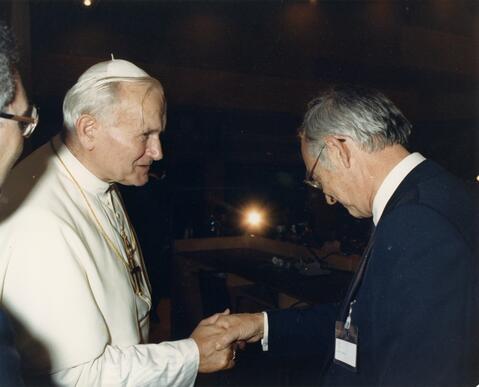
Title and statement of responsibility area
Titel
Algemene aanduiding van het materiaal
- Grafisch materiaal
Parallelle titel
Overige titelinformatie
Title statements of responsibility
Titel aantekeningen
Beschrijvingsniveau
archiefbewaarplaats
referentie code
Editie
Editie
Edition statement of responsibility
Class of material specific details area
Statement of scale (cartographic)
Statement of projection (cartographic)
Statement of coordinates (cartographic)
Statement of scale (architectural)
Issuing jurisdiction and denomination (philatelic)
Datering archiefvorming
Datum(s)
Fysieke beschrijving
Fysieke beschrijving
Publisher's series area
Title proper of publisher's series
Parallel titles of publisher's series
Other title information of publisher's series
Statement of responsibility relating to publisher's series
Numbering within publisher's series
Note on publisher's series
Archivistische beschrijving
Naam van de archiefvormer
Biografie
Rev. Dr. Robert Darwin Crouse (1930-2011) was born in Winthrop, Massachusetts to Merle and Sarah (Crooks) Crouse. His family had moved to Massachusetts from Nova Scotia, where his family had been for generations. Before her marriage, Sarah was trained in telegraphy and worked with the Canadian Pacific Railway in Montreal, moving back to Nova Scotia to train in the medical field at the Victoria General Hospital in Halifax. She graduated in 1924. Merle was an agent at the Mutual Life Insurance Company. Merle and Sarah were married in 1926 in Lunenburg County. When Robert was only a few months old, his family moved back to the aptly named Crousetown in Lunenburg County, Nova Scotia. Sarah died from tuberculosis when Robert was six years old, and he and the rest of the family moved into his grandparent’s house next-door.
His schooling began in a one-room schoolhouse in Crousetown, and he later went to King’s Collegiate School in Windsor, NS from 1943 to 1947. After secondary school, he completed a Bachelor of Arts at the University of King’s College in Halifax in 1951, and spent a year studying philosophy and theology at King’s and Dalhousie University. He later received a Baccalaureate of Sacred Theology at Harvard University in Cambridge, Massachusetts in 1954, and was ordained into the priesthood of the Anglican Church of Canada by Bishop Waterman in the same year. He went on to complete a Master of Theology in 1957 at Trinity College in Toronto, Ontario. While finishing his degree at Trinity College, he contributed significantly to the Scholastic Miscellany, edited by the Revd Dr. Eugene R. Fairweather. Crouse’s master’s dissertation was on St. Augustine’s Doctrine of Justitia. He took a break from schooling but returned in 1970, completing a Ph.D (Honorius Augustodunensis). At King’s, he was awarded an Honorary Doctor of Divinity in 2007.
Crouse was an accomplished educator and theologian. He also had a deep appreciation and love for poetry, literature, architecture, and music. He began teaching in 1960 at the Bishop’s University in Lennoxville, Québec. He remained there for three years, before returning to Nova Scotia. He took up a position teaching in Dalhousie’s Classics Department and King’s Foundation Year Programme. Crouse was also one of the driving forces behind the Foundation Year Programme. He remained at King’s/Dal until his retirement in 1995. From 1990-2004, he was also a visiting professor at Patrology at the Augustinianum of the Pontifical Lateran University in Rome, making him the first non-Catholic invited to this position. He became a Carnegie Professor at King’s in 1979 and served as Clerk of Convocation from 1972-1994. He was Vice President of King’s for two years, and served as Director of the Foundation Year Program for one. He was made the Canon Theologian of the Diocese of Saskatchewan in 1996, and was a member of the Primate’s Theological Commission from the 1990s into the early 2000s.
Crouse wrote over 70 academic papers and books, with his research focusing on the works of Augustine and Dante. He was an important figure at the annual Atlantic Theological Conferences and cared deeply about the Maritime context in which he was raised. Crouse was also a musician– he played the organ at several parishes throughout his lifetime and established the Summer Baroque concerts in Crousetown. He found the last tracker organ in Nova Scotia, which he installed in St. Mary’s in Crousetown. He also established the choir for the Thursday Solemn Eucharist at the King’s Chapel.
He loved hosting people to his home, students and colleagues alike, and was an avid gardener. Many friends remember his extravagant salads, which at times had “30 or more ingredients.” Notably, he did not own a telephone or a computer and faxed all of his communications. He preferred to have time to sit and contemplate his responses. He died at the age of 80, in his grandparent’s house in Crousetown, where he lived his entire life when he was not studying or travelling.
